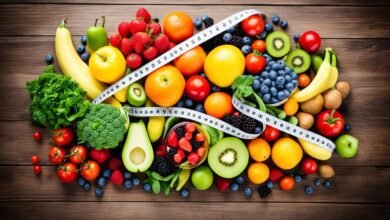The Importance of Proper Nutrition in Achieving Fitness Success

Proper nutrition is a cornerstone of achieving fitness success. Whether you’re looking to lose weight, build muscle, or simply improve your overall health, what you eat plays a critical role in your ability to reach your fitness goals. In this comprehensive article, we will delve deep into the significance of proper nutrition in achieving fitness success. We’ll explore the connection between diet and exercise, the impact of macronutrients and micronutrients, and the importance of individualized nutrition plans. By the end of this article, you’ll have a clear understanding of why nutrition is so vital in your fitness journey and practical tips to help you make informed dietary choices.
Table of Contents
Introduction
The Relationship Between Nutrition and Fitness
Understanding Macronutrients a. Carbohydrates b. Proteins c. Fats
Micronutrients: The Unsung Heroes a. Vitamins b. Minerals
The Impact of Hydration
1. Introduction
Fitness success is a goal that many individuals aspire to achieve. Whether it’s for the sake of a leaner physique, improved health, or enhanced athletic performance, proper nutrition is a fundamental component of reaching one’s fitness objectives. This article aims to shed light on the critical role that nutrition plays in achieving fitness success and provide valuable insights into how you can optimize your diet to support your fitness goals.
Achieving fitness success is a multi-faceted journey that involves a combination of physical activity and dietary choices. While exercise is undoubtedly crucial, nutrition is often the determining factor in whether or not your efforts in the gym or on the track yield the desired results. Without proper nutrition, your body lacks the essential building blocks and energy it needs to function optimally, recover from exercise, and adapt to the stressors you place on it.
In this article, we will explore the intricate relationship between nutrition and fitness, dissect the role of macronutrients and micronutrients, and discuss the importance of hydration. We will also delve into the creation of personalized nutrition plans, the significance of diet in weight management, and the timing of meals concerning workouts. Along the way, we will highlight common nutritional mistakes and provide practical tips for achieving fitness success.
2. The Relationship Between Nutrition and Fitness

To understand the importance of proper nutrition in achieving fitness success, it’s essential to recognize the close relationship between what you eat and how your body responds to physical activity. The food you consume serves as the raw material for your body’s functions and the energy source for all your activities.
When you engage in physical exercise, your body requires additional energy and nutrients to support the increased demands placed on your muscles, cardiovascular system, and other physiological processes. This is where proper nutrition comes into play. Without the right nutrients, your body may struggle to perform optimally and recover efficiently after workouts.
Here are some key ways in which nutrition and fitness are interconnected:
Energy Balance
To sustain physical activity, your body needs energy. The primary source of this energy is the calories derived from the food you consume. Calories are units of energy, and the balance between the calories you consume (through food and beverages) and the calories you expend (through physical activity and metabolic processes) determines whether you gain, lose, or maintain your weight.
If you’re looking to lose weight, creating a calorie deficit by consuming fewer calories than you burn is essential. Conversely, if you aim to gain muscle or maintain your current weight, you need to ensure that your calorie intake matches your energy expenditure.
Muscle Building and Repair
Resistance training, such as weightlifting, stimulates muscle growth and repair. To support these processes, your body requires an adequate intake of protein. Protein is composed of amino acids, which are the building blocks of muscle tissue. Consuming enough protein in your diet ensures that your body has the necessary resources to repair and build muscle tissue, resulting in increased strength and muscle mass.
Recovery and Adaptation
Physical exercise places stress on your body, causing microscopic damage to muscle fibers and depleting energy stores. To recover and adapt to these stressors, your body relies on the nutrients provided by your diet. Proper nutrition helps speed up the recovery process, reduce muscle soreness, and enhance your body’s ability to adapt to exercise, ultimately leading to better fitness gains.
Endurance and Cardiovascular Health
Cardiovascular exercise, such as running or cycling, requires a steady supply of energy. Carbohydrates are a primary source of energy for endurance activities. Proper carbohydrate intake ensures that you have the necessary glycogen stores in your muscles and liver to sustain prolonged physical activity. Additionally, a balanced diet rich in fruits, vegetables, and whole grains can contribute to improved cardiovascular health.
Immune Function
Regular exercise can have a positive impact on your immune system, making you less susceptible to illness. However, intense or prolonged exercise can temporarily weaken the immune system. Proper nutrition, with a focus on vitamins, minerals, and antioxidants, can help support immune function and minimize the negative effects of exercise-induced immune suppression.
Metabolic Health
Fitness isn’t just about appearance and performance; it’s also about health. Maintaining proper nutrition can help regulate blood sugar levels, manage cholesterol, and reduce the risk of chronic diseases like diabetes and heart disease. A balanced diet can also help control inflammation, which is a contributing factor to various health issues.
In summary, proper nutrition is the linchpin that allows your body to perform optimally, recover effectively, and adapt to the challenges of physical exercise. Without the right nutrients in your diet, your fitness progress may be hindered, and you may even risk compromising your health in the long run.
3. Understanding Macronutrients

Macronutrients are the three main categories of nutrients that provide energy for your body: carbohydrates, proteins, and fats. These macronutrients play distinct roles in your diet and are essential for various aspects of your fitness journey.
- Carbohydrates
Carbohydrates are the body’s primary source of energy, especially during high-intensity exercise. They are broken down into glucose, which is used to fuel your muscles and brain. Carbohydrates come in two main forms: simple (sugars) and complex (starches and fiber).
Simple carbohydrates are quickly digested and can provide a rapid energy boost, making them suitable for refueling during or after intense workouts. They are found in foods like fruits, candy, and sugary drinks. However, it’s important to consume them in moderation, as excessive sugar intake can lead to energy spikes and crashes.
Complex carbohydrates take longer to digest, providing a steady and sustained source of energy. They are found in foods like whole grains, vegetables, and legumes. Including complex carbohydrates in your diet is crucial for endurance and overall energy levels.
For fitness success, your carbohydrate intake should be tailored to your activity level. Athletes and individuals engaged in intense exercise may require more carbohydrates to fuel their workouts and recover effectively, while those with a more sedentary lifestyle may benefit from a lower carbohydrate intake to prevent excessive calorie consumption.
- Proteins
Proteins are vital for muscle repair and growth. They are composed of amino acids, which are the building blocks of the body’s tissues, including muscles. Adequate protein intake is essential for supporting muscle recovery and promoting a positive nitrogen balance, which is a state in which protein synthesis exceeds protein breakdown.
The protein requirements of an individual can vary depending on factors like age, sex, activity level, and fitness goals. Athletes and those engaged in strength training may need more protein to support muscle development, while individuals with more modest fitness goals can meet their protein needs with a balanced diet.
Quality protein sources include lean meats, poultry, fish, dairy products, eggs, and plant-based options like tofu, tempeh, and legumes. It’s important to vary your protein sources to ensure you get a wide range of amino acids.
- Fats
Dietary fats are often misunderstood and sometimes unfairly demonized. Fats are an essential part of a balanced diet, and they play various roles in the body, such as providing energy, supporting cell function, and aiding in the absorption of fat-soluble vitamins (A, D, E, and K).
There are different types of dietary fats, including saturated fats, unsaturated fats, and trans fats. Saturated fats, found in animal products and some tropical oils, should be consumed in moderation to promote heart health. Unsaturated fats, found in foods like avocados, nuts, and olive oil, are beneficial for cardiovascular health.
It’s worth noting that while fats are an important part of a healthy diet, they are calorie-dense, so portion control is necessary, especially if you’re trying to manage your weight. A diet too high in fat can lead to excess calorie intake and weight gain.
In summary, macronutrients are the foundation of your diet, providing the energy and building blocks your body needs to function optimally and support your fitness goals. Balancing your intake of carbohydrates, proteins, and fats based on your activity level and individual requirements is key to achieving fitness success.
4. Micronutrients: The Unsung Heroes
While macronutrients (carbohydrates, proteins, and fats) provide the energy and structural components needed for the body’s functioning, micronutrients are equally vital, albeit in smaller quantities. Micronutrients include vitamins and minerals, and they play essential roles in various physiological processes.
- Vitamins
Vitamins are organic compounds that are essential for normal growth and overall health. They play crucial roles in various bodily functions, including metabolism, immune function, and the maintenance of healthy skin, hair, and vision. There are two main categories of vitamins:
Water-Soluble Vitamins
These vitamins dissolve in water and are not stored in the body, which means they need to be consumed regularly. Examples of water-soluble vitamins include vitamin C and the B-complex vitamins (e.g., B1, B2, B3, B6, B12, and folic acid). They are commonly found in fruits, vegetables, and whole grains.
Fat-Soluble Vitamins
Fat-soluble vitamins, on the other hand, are stored in the body’s fatty tissues. This means that excess consumption of fat-soluble vitamins can lead to toxicity. The four fat-soluble vitamins are vitamins A, D, E, and K. Vitamin A is essential for vision and immune function, vitamin D is important for bone health, vitamin E is an antioxidant that helps protect cells, and vitamin K plays a role in blood clotting. These vitamins are typically found in foods like eggs, dairy, and leafy greens.
A balanced and varied diet that includes a wide range of fruits and vegetables can help ensure that you get the necessary vitamins for overall health and fitness success. In some cases, individuals may benefit from vitamin supplements, but it’s essential to consult with a healthcare professional before adding supplements to your routine.
- Minerals
Minerals are inorganic substances that are essential for various physiological functions. They play roles in bone health, fluid balance, nerve function, and more. There are two main categories of minerals:
Major Minerals
Major minerals are required in larger amounts by the body. These include minerals like calcium, phosphorus, magnesium, sodium, and potassium. Calcium is essential for bone health and muscle function, while sodium and potassium are crucial for nerve function and maintaining proper fluid balance.
Trace Minerals
Trace minerals are required in smaller quantities, but they are no less important. Some examples of trace minerals include iron, zinc, copper, selenium, and iodine. Iron is essential for oxygen transport in the blood, zinc plays a role in immune function and wound healing, and iodine is necessary for thyroid function.
Balancing your intake of vitamins and minerals through a varied diet that includes fruits, vegetables, whole grains, lean proteins, and dairy or dairy alternatives is crucial for overall health and can directly impact your fitness success. Inadequate intake of these micronutrients can lead to deficiencies that hinder your body’s ability to perform at its best.
5. The Impact of Hydration
Hydration is often overlooked but is a critical aspect of proper nutrition, particularly for fitness success. Water is essential for various bodily functions, including temperature regulation, digestion, circulation, and the elimination of waste products. Dehydration can lead to a decrease in exercise performance and hinder recovery.
Here’s how hydration impacts your fitness journey:
Temperature Regulation
During physical activity, your body produces heat. To prevent overheating, it releases this heat through sweating. Sweating leads to fluid loss, and if not adequately replaced, dehydration can occur. Dehydrated individuals are more prone to overheating, which can negatively affect exercise performance and increase the risk of heat-related illnesses.
Circulation and Oxygen Transport
Adequate hydration helps maintain proper blood volume, which is essential for the efficient transport of oxygen and nutrients to your muscles during exercise. Dehydration can lead to reduced blood flow, making it more challenging for your muscles to receive the necessary oxygen and nutrients. This can result in premature fatigue and reduced performance.
Electrolyte Balance
Sweating not only leads to water loss but also the loss of electrolytes, such as sodium, potassium, and chloride. These electrolytes are essential for nerve and muscle function. Dehydration, along with the loss of electrolytes, can lead to muscle cramps, weakness, and impaired neuromuscular function.
Recovery
Proper hydration is crucial for post-exercise recovery. Replenishing fluids lost during a workout helps to restore normal bodily functions, remove waste products, and aid in the repair and rebuilding of muscles. Without adequate hydration, recovery times may be prolonged, and the risk of muscle soreness increases.
To maintain proper hydration, it’s essential to:
Drink water regularly throughout the day, not just when you’re thirsty.
Monitor your fluid intake, especially during exercise.
Consider the environmental conditions, as hot and humid weather can increase fluid needs.
Pay attention to urine color; pale yellow urine is an indicator of adequate hydration.
Rehydrate after exercise by consuming fluids and electrolytes.
In summary, staying adequately hydrated is a fundamental aspect of proper nutrition for fitness success. Failing to maintain proper fluid balance can lead to reduced exercise performance, slower recovery, and an increased risk of exercise-related injuries.




